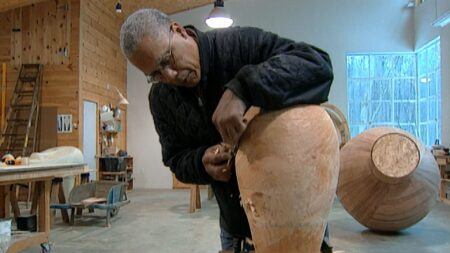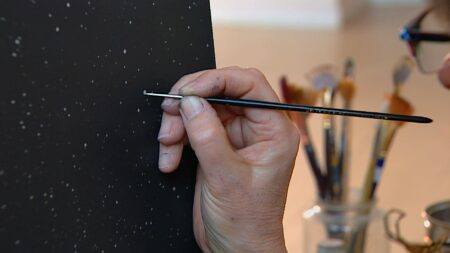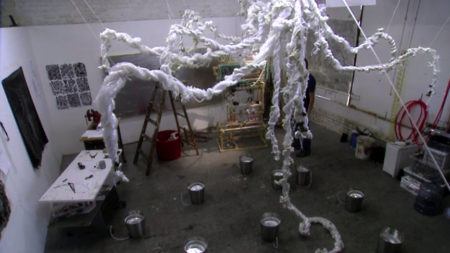Continue playing
(Time remaining: )
Play from beginning
Continue playing "{{ controller.videos[controller.getVideo(controller.currentVideo)].segmentParentTitle}}"
{{controller.videos[controller.getVideo(controller.currentVideo)].title}} has ended.
Tim Hawkinson in "Time"
Tim Hawkinson tinkers with everyday materials to build surprising mechanical art works. “I guess it comes from early on in childhood, a fascination with moving parts and sort of the magical,” he suggests.
In his studio, Hawkinson explains how he used gears, switches, nozzles, buckets, and pie tins to build a drumming machine that captures random drips of rain, amplifies them, and organizes them into music. “It’s not even electronics. I don’t know what it is,” he admits. One of Hawkinson’s largest projects, Überorgan, is an inflatable installation in a space the size of a football field. For a version of the artwork the artists created a score for the organ using old church hymns.
Credits
Created by: Susan Sollins & Susan Dowling. Executive Producer & Curator: Susan Sollins. Series Producer: Eve-Laure Moros Ortega. Associate Producer: Migs Wright. Assistant Curator: Wesley Miller. Production Manager: Alice Bertoni & Laura Recht. Production Coordinator: Kelly Shindler & Sara Simonson. Director of Education & Outreach: Jessica Hamlin. Producer: Catherine Tatge. Editor: Joanna Kiernan. Host Segment Artist: Charles Atlas. Host: Merce Cunningham. Director of Photography: Bob Elfstrom, Dean Head, Gary Henoch, Mead Hunt, Tom Hurwitz, Ken Kobland, William Rexer, Nancy Schreiber, & Joel Shapiro. Sound: Brian Buckley, Gautum Choudhury, Doug Dunderdale, Alex Lamm, Eric Leung, Mark Mandler, Juan Rodriguez, Jerry Stein, JT Takagi, Bill Wander, & Merce Williams. Gaffer/Grip: William Arbuckle, Eric Boland, Jeff Panessa, Ken Shibata, & Andrew Wilson. Assistant Camera: Jarred Alterman, Marie Chao, Brian Hwang, Steve Nealey, Kipjaz Savoie, & Tam Yong Xing. Host Make-Up: Joanne Nöél. Production Assistant: Ronny Merdinger, Jo-ey Tang, & Jesse Whittle-Utter. Assistant Avid Editor: Geoff Gruetzmacher, Jeremy Siefer, & Lynn True. Still Photographers: Alice Bertoni & Bob Elfstrom.
Creative Consultant: Ed Sherin. Graphic Design & Animation: Open, New York. Animation, Visual Effects & Compositing: Spontaneous Combustion. On-Line Editor: Don Wyllie & Frame:Runner NYC. Composer: Peter Foley. Voice-Over Artist: Jace Alexander. Sound Editing: Margaret Crimmins, Greg Smith, & Dog Bark Sound. Sound Mix: Tony Volante & Soundtrack F/T. Animation Stand: Frank Ferrigno & Frame:Runner NYC.
Artworks courtesy of: Vija Celmins; Tim Hawkinson; Paul Pfeiffer; Martin Puryear; Ace Gallery; The Edward R. Broida Collection; MASS MoCA; McKee Gallery; Modern Art Museum of Fort Worth; & The Project, New York and Los Angeles. Archival footage courtesy of: Nancy Kelly &
TV Asahi Productions.
Special Thanks: ArtPace; The Art21 Board of Trustees; Asia Pacific Vision; Jamie Bennett; Cathy Blanchflower; Trevor Carlson; Maggie Choy; The Corcoran Gallery of Art; Cunningham Dance Foundation; Jeanne Englert; Tom James; Hiroko Kikuchi; Tim Lloyd; The Metropolitan Museum of Art; MIT List Visual Arts Center; Rashaad Newsome; Oliver Ranch; Paulson Press; Samantha Rippner; Susan Rogers; Masami Shiraishi; Tammie Tsang; Yumi Umemura; Whitney Museum of American Art; & Rebecca Wilhelms.
Interns: Sharon Ber, Elana Davidian, Eliza Geddes, Karmin Guzder, Ehren Joseph, Lisa Kalikow, Lila Kanner, Crystal Kui, Daniela Leonard, Ronny Merdinger, Parth Savla, Kristen Smith, Whitney Smith, Morgan Soloski, Jo-ey Tang, Asya Varshishky, Jesse Whittle-Utter, & Jeremy Zilar.
Public Relations: Kelly & Salerno Communications. Legal Counsel: Albert Gottesman. Bookkeeper: William Handy.
Major underwriting for Season 2 of Art in the Twenty-First Century is provided by National Endowment for the Arts, PBS, Corporation for Public Broadcasting, The Allen Foundation for the Arts, Agnes Gund and Daniel Shapiro, Bloomberg, The Jon and Mary Shirley Foundation, Nonprofit Finance Fund, JPMorgan Chase, The Andy Warhol Foundation for the Visual Arts, The Horace W. Goldsmith Foundation, New York Arts Recovery Fund, Peter Norton Family Foundation, New York Times Company Foundation, Dorothea L. Leonhart Foundation, and Elizabeth Firestone Graham Foundation.
Closed captionsAvailable in English, German, Romanian, Italian, Japanese, Korean, Chinese, Italian
Through the Art21 Translation Project, multilingual audiences from around the globe can contribute translations, making Art21 films more accessible worldwide. Translate this video now.
Interested in showing this film in an exhibition or public screening? To license this video please visit Licensing & Reproduction.
Tim Hawkinson is renowned for creating complex sculptural systems through surprisingly simple means. His installation, Überorgan—a stadium-size, fully automated bagpipe—was pieced together from bits of electrical hardware and several miles of inflated plastic sheeting. The source of inspiration for many of Hawkinson’s pieces has been the re-imagining of his own body, and what it means to make a self-portrait of this new or fictionalized body. In 1997, the artist created an exacting, two-inch-tall skeleton of a bird from his own fingernail parings; believable even at a close distance, this work reveals Hawkinson’s attention to detail as well as his obsession with life, death, and the passage of time.
“In my work, I tried to maintain some of that freshness and keep shifting what it is that I’m looking at to see it differently or creating a different process of looking at something that gives me a new kind of interpretation.”
Tim Hawkinson
Tim Hawkinson
Preview





